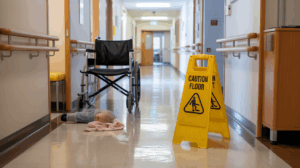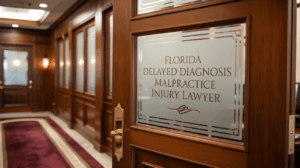
Losing your vision can change your life. Vision loss caused by a medical mistake can affect your ability to work, drive, or care for yourself. Many people require long-term rehabilitation, adaptive devices, and home modifications. These challenges can create significant financial and emotional strain for both victims and their families.
If your loss of vision was caused by medical negligence, you may have grounds for a legal claim. Mistakes during surgeries, misdiagnoses, or improper treatments can lead to partial or total vision loss. A Fort Lauderdale medical malpractice lawyer can help you pursue compensation for your medical bills and other losses.
What to Do If Loss of Vision Is Caused by Medical Negligence
If you believe your vision loss was caused by a medical mistake, you should:
- Seek medical evaluation: Ensure your vision loss is fully documented by a qualified eye specialist. Accurate medical records are essential for any claim.
- Preserve all records: Keep copies of all surgical notes, prescriptions, test results, and communications with healthcare providers.
- Report the incident: Notify your healthcare provider’s office and consider filing a complaint with the medical board.
- Consult a medical malpractice attorney: Our experienced lawyers can assess your case, explain your legal options, and help you pursue compensation.
Signs That Loss of Vision Was Caused by Medical Negligence
Not all vision problems stem from medical errors, but certain warning signs may indicate that a healthcare provider’s actions or omissions played a role. Those signs include:
- Sudden or unexpected vision loss after surgery: If you experience severe visual changes immediately after a procedure such as cataract surgery, LASIK, or retinal repair, this could indicate surgical error or post-operative complications.
- Delayed diagnosis of serious eye conditions: Conditions like glaucoma, retinal detachment, or macular degeneration require prompt treatment. A delay that leads to preventable vision loss may be evidence of negligence.
- Incorrect medication or dosage: Some medications can damage the optic nerve or retina if prescribed incorrectly. Vision problems arising from medication errors can be a sign of medical malpractice.
- Improper monitoring during treatment: Eye diseases often require ongoing monitoring. Failure to track changes or adjust treatment plans may lead to irreversible vision damage.
- Failure to inform of risks: Doctors have a duty to explain the risks of procedures and medications. Vision loss following undisclosed risks could be grounds for a claim.
Common Medical Mistakes That Can Lead to Vision Loss
Knowing which medical mistakes can cause vision loss can help determine whether negligence occurred. These mistakes include:
- Surgical errors: Accidental damage to the eye or optic nerve during surgery can result in permanent vision loss.
- Misdiagnosis: Failing to identify conditions such as glaucoma or retinal tears in time can prevent effective treatment and worsen outcomes.
- Medication mistakes: Prescribing the wrong medication or incorrect dosage can harm the optic nerve or retina, leading to vision impairment.
- Infection or post-operative complications: Inadequate hygiene, sterilization, or follow-up care can cause infections that damage eyesight.
- Improper use of medical devices: Incorrect fitting or adjustment of lenses, implants, or laser equipment can result in serious eye injuries.
Who Can Be Held Liable for Vision Loss Caused by Medical Negligence?
Several parties may be legally responsible when vision loss results from a medical mistake. Potentially liable parties include:
- Ophthalmologists or surgeons: The primary doctor performing surgery or treatment may be responsible if their errors or omissions directly caused vision loss.
- Other medical staff: Nurses, anesthesiologists, or technicians can be liable if their negligence contributed to the injury.
- Hospitals or clinics: Facilities may be held accountable for failing to maintain proper standards, provide adequate staff training, or ensure safe equipment.
- Pharmaceutical companies: In some cases, manufacturers may be responsible if defective or improperly labeled medications cause vision damage.
How to Prove Medical Negligence in a Vision Loss Case
Proving that medical negligence caused vision loss requires strong evidence and expert support. For a successful claim, you must establish the following:
- Duty of care: You must show that the healthcare provider owed you a professional duty to deliver competent medical treatment.
- Breach of duty: It must be proven that the provider failed to meet accepted medical standards through action or inaction.
- Causation: There needs to be a clear link between the provider’s mistake and your vision loss or eye injury.
- Damages: You must demonstrate that you suffered measurable harm, such as medical expenses, lost income, or emotional distress, as a result of the negligence.
A medical malpractice lawyer can help gather evidence to prove liability.
How a Medical Malpractice Lawyer Can Help
Medical malpractice claims are complex, and an experienced lawyer can manage the process and safeguard your legal interests. Specifically, they can help with:
- Case evaluation: Lawyers can review your medical records, treatment history, and available evidence to determine if negligence occurred.
- Identifying liable parties: They can help identify all individuals or entities responsible for the injury.
- Negotiating settlements: Lawyers can negotiate with insurance companies or medical providers to secure fair compensation.
- Representation: If the case goes to court, your lawyer can advocate for you there.
Contact a Medical Malpractice Attorney
Vision loss can lead to all kinds of unexpected expenses. A medical malpractice lawyer from Anidjar & Levine can gather evidence to prove negligence and help you obtain compensation for your injury.
Book a free case review to start putting together your claim.










